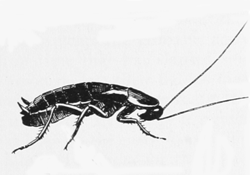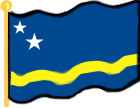Kakalaka pretu
The person who sent me this song wrote, "This is a rhyme from Curacao, in the Netherlands Antilles, a small Caribbean island off the coast of Venezuela. It's a little kid's rhyme. It is written in "Papiamento", a dialect only spoken on three islands in the world: Curacao, Aruba, and Bonaire."

Kakalaka pretu
Black Cockroach
Rhyme
Rhyme
(Papiamentu)
(English)
Kakalaka pretu, pretu
El a bula riba May
May a spanta, dal un gritu,
Kakalaka core bay.
Black, black cockroach
Jumped on mom
Mom was startled, gave out a cry,
Cockroach ran away.
Notes
Papiamento is a Spanish/Portuguese/Dutch/English dialect. It's interesting to see which language the different words in the rhyme come from:
Kakalaka : Dutch "kakkerlak" = cockroach
Pretu : Portuguese "preto" = black
El : Spanish = he/it (Portuguese = ele)
A : Spanish "ha" = has
Riba : Spanish "arriba"= up, on top of
May : Portuguese Mãe = Mother
Spanta : Spanish and Portuguese "espantar"= to frighten
Dal : Spanish and Portuguese "dar"= "to give" (in Portuguese and Spanish, they "give a cry" in French they "push a cry" and in English they "cry out" i.e. they "release a cry")
Un : Spanish "un" = a/an
Gritu : Portuguese "grito"= cry/shout
Core : Portuguese and Spanish "corre"= it runs
Bay must be English "bye" => away
Couldn't find "bula".
*****
Orlando Haynes wrote:
Papiamentu as many people would think is not as derivative as people would let you to believe. Yes it is made up from several languages, but just as Dutch, German, Frisian, Spanish and Occitan, provencal, are kin, so is Papiamento kin to mostly Latin languages, but also have African, Amerindian, Dutch, English and more words. Papiamentu is a latin language and it differs because the way it's written is phonetic and have no typical Latin grammatical rules as most people would know. Being a young language it have modern implications that most older languages can take heed of. Here are some songs and corrections to your translation of kakalaka pretu.
El = E, which only occurs in El-form when a vowel follows [this is only in speech and poetry] but the 3rd person singular is "E" = he/she /it and also the definite article 'the" logic makes it the all nouns singular are in the 3rd person singular eg. The man= he, the dog = it so in Papiamento the article is also "e" e homber = the man, e cacho= the dog
El a bula riba may = He/she/it jumped on mommy 'bula = to fly, to jump [because you fly for a very short time nevertheless you flew] like the Italian word Volare many Papiamento noun beginning with "B" you will find other latin languages using 'V' but their pronunciation is a soft B. May a spanta dal un gritu = mommy got scare and hit a scream Dal= to hit colloquial use hit is when you do something hard so you hit it thus also a scream! So it doesn't come from Dar! To give = Duna which come from the Latin Donna like the the song Donna nobis pacem is in papaiamento Duna nos pas which means "give us peace" Kakalaka a core bay = cockroach ran away, [this is Papiamento at it finest] Core = Correr = run 'a' has no meaning but it tell you something !!!! when you see 'a' in Papiamento it means whatever is happening in the sentence is Past Tense. I dubbed these words tense indicators! There 3 principle tense indicators and one minor one: Ta à present tense, A à Past Tense [when the action is totally finished] Loà future tense and Tabataà past tense that not jet over. [minor indicator because is not used much in speech] So kakalaka a core bay is old Papiamento or Aruban spelling today we say Kalaka a kore bai [modern phonetic spelling] 'a' indicator of time kore =to run 'bai =to go.
I hope this give you a better understanding of one of our languages here in the Netherlands Antilles!
Thanks for writing Orlando! I posted your version of the rhyme for people to read below:
Kakalaka pretu, pretu
El a bula riba may
May a spanta dal* un gritu
Kakalaka a core bay**
Black, black cockroach
He/she/it jumped on mommy
Mommy got scared and hit a scream*
Cockroach ran away.
*Dal = to hit - colloquial use hit is when you do something hard, so you hit it, thus also a scream!
**"Kakalaka a core bay" is old Papiamento or Aruban spelling. Today we say "Kalaka a kore bai" (modern phonetic spelling).

Thanks!
Thanks and Acknowledgements
Thanks to the original contributor and Orlando Haynes for explaining and translating this rhyme!
Image: Snodgrass common household roaches
Danki!

























